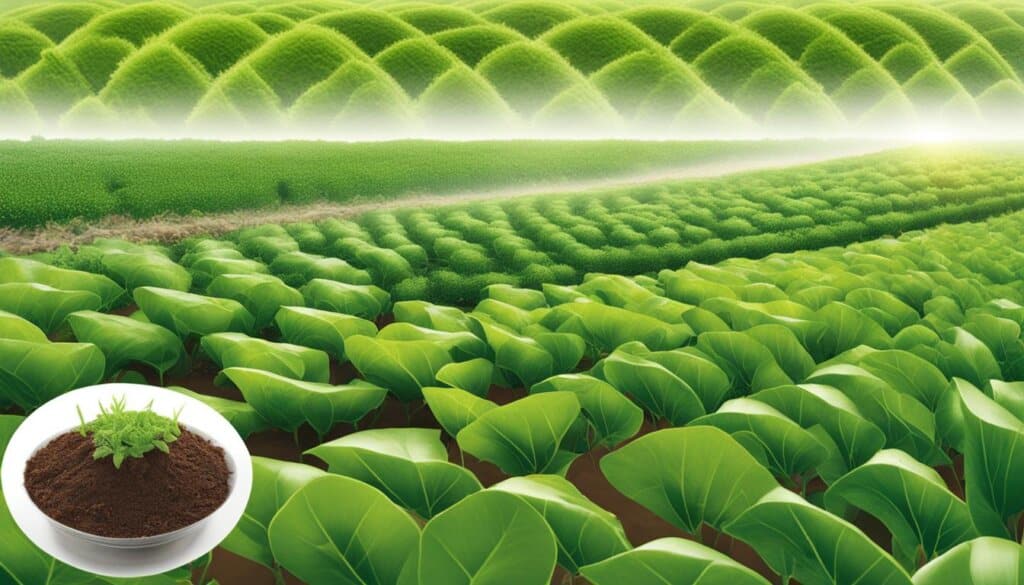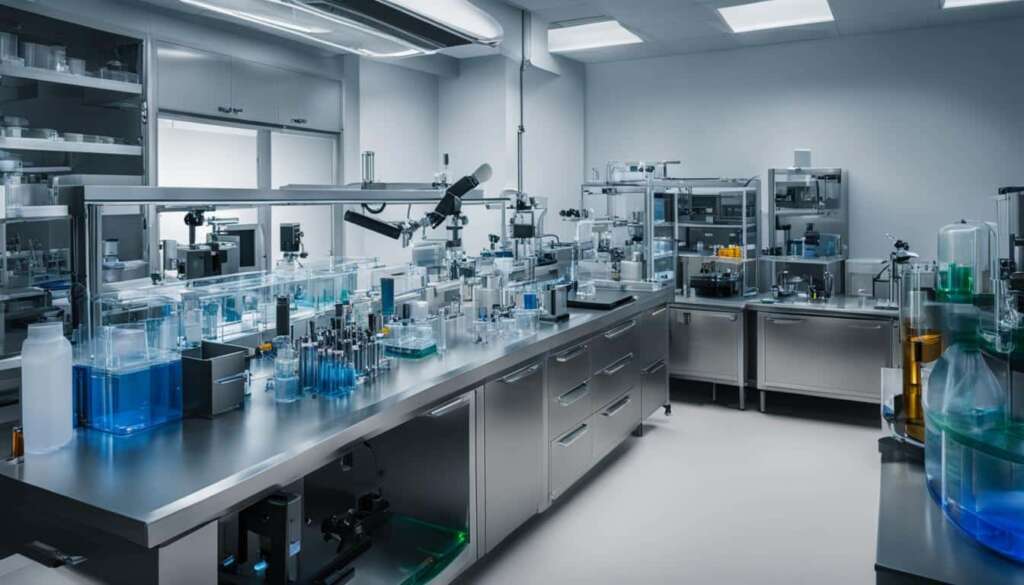Table of Contents
Biotechnology is a multidisciplinary field with a major impact on various aspects of our lives. It involves working with cells or cell-derived molecules for a wide range of applications. Biotechnology is often referred to as the “technology of hope” due to its potential to improve human health, well-being of other life forms, and the environment. It has revolutionized diagnostics, therapeutics, and personalized medicine in the healthcare system. Biotechnology has also made significant contributions to environmental remediation, agriculture, and the production of biofuels.
It explores the products obtainable from aquatic organisms through marine biotechnology. However, ethical issues and concerns play a role in defining laws governing the feasibility and approval of biotechnology research.
Biotechnology has the potential to impact and transform our lives in profound ways. It has found applications in medicine, agriculture, environmental remediation, and other fields. By harnessing the power of cells and molecules, biotechnology has changed how we approach healthcare, enhanced crop productivity, and addressed environmental challenges. Understanding the applications and impact of biotechnology is essential in navigating its potential benefits and ethical considerations.
The History and Evolution of Biotechnology
The term “biotechnology” was coined by Hungarian engineer Karl Ereky in 1919. Biotechnology has its roots in the domestication of plants and animals and the discovery of fermentation, which gave rise to products like bread and vaccines.
In the modern era, biotechnology has evolved significantly, particularly with the advent of genetic engineering. This scientific discipline emerged in the second half of the 20th century, coinciding with groundbreaking discoveries such as the structure of DNA and the mapping of the human genome.
Genetic engineering, a prominent aspect of biotechnology, allows for the modification of genes within the same species or the transfer of genes between different species. This process leads to the creation of genetically modified organisms (GMOs) with desired traits or characteristics.
Genetic engineering enables scientists to manipulate genetic material, revolutionizing various fields of research and application. It has opened up new possibilities for improving crop yield and resistance, developing effective therapies for genetic diseases, and enhancing industrial processes.
The history and evolution of biotechnology show how our understanding of genetics, combined with innovative scientific techniques, has paved the way for remarkable advancements and applications across diverse industries.
Applications of Biotechnology in Medicine and Healthcare
Biotechnology has revolutionized the field of medicine and healthcare, leading to significant advancements in therapeutics, gene therapy, and diagnostic tools. These applications have transformed the treatment and prevention of diseases, offering hope for patients and medical professionals alike.
One of the major breakthroughs in biotechnology is the development of biopharmaceuticals. These are medications produced using biotechnology techniques, such as recombinant DNA technology, to create complex molecules with targeted therapeutic effects. Biopharmaceuticals have proven to be highly effective in treating a wide range of medical conditions, including diabetes, cancer, autoimmune disorders, and rare genetic diseases.
Human insulin is a prime example of a biopharmaceutical that has changed the lives of millions of people with diabetes. Before the advent of biotechnology, insulin was extracted from animal sources, which posed potential risks and limitations. Biotechnology enabled the production of synthetic insulin that is identical to human insulin, ensuring safer and more effective treatment for diabetes patients.
Monoclonal antibodies, another groundbreaking development in biotechnology, have become indispensable in cancer treatment. These antibodies are designed to target specific molecules involved in the growth and spread of cancer cells, leading to more precise and effective therapies. Monoclonal antibody therapies have revolutionized the treatment landscape for various types of cancer, offering new hope to patients.
Gene Therapy: Transforming Lives at the Genetic Level
Gene therapy is a cutting-edge application of biotechnology that aims to treat diseases by modifying or replacing faulty genes within a person’s cells. This revolutionary approach has the potential to address genetic disorders at their root cause, offering the possibility of long-term and even permanent cures.
Gene therapy holds immense promise for a wide range of conditions, including inherited disorders, genetic cancers, and rare diseases. It involves introducing therapeutic genes into a patient’s cells to correct the genetic defect or provide the missing functional protein. This can be achieved using viral vectors or other delivery systems designed to safely transport the therapeutic genes into targeted cells.
One of the most remarkable success stories of gene therapy is the treatment of infants born with severe combined immunodeficiency (SCID), also known as “bubble baby” disease. By introducing a functional copy of the defective gene responsible for SCID, gene therapy has successfully restored the immune function in these patients, enabling them to live normal, healthy lives.
Stem cell research, another groundbreaking field within biotechnology, has opened up new frontiers in regenerative medicine. Stem cells have the unique ability to develop into different types of specialized cells, making them invaluable for repairing damaged tissues and organs. Biotechnology has provided the tools and techniques to manipulate and grow stem cells in controlled environments, allowing for the development of potential therapies for conditions such as Parkinson’s disease, spinal cord injuries, and heart disease.
Diagnostic Tools and Vaccine Development
Biotechnology has also played a crucial role in the development of diagnostic tools that aid in the detection and diagnosis of diseases. For example, pregnancy tests, which rely on detecting the presence of human chorionic gonadotropin (hCG) hormone in urine, are a result of biotechnology advancements. These simple yet highly effective tests have become a staple in healthcare, providing quick and accurate results to confirm pregnancy.
Furthermore, biotechnology has been at the forefront of researching dangerous pathogens and developing vaccines to combat infectious diseases. Through the manipulation of genes, scientists have been able to produce safe and effective vaccines, protecting populations against diseases such as measles, polio, influenza, and COVID-19. This has been crucial in preventing outbreaks and saving countless lives worldwide.
Biotechnology’s applications in medicine and healthcare continue to push the boundaries of what is possible in modern healthcare. With ongoing advancements and research, the potential for biotechnology to drive further breakthroughs and improve patient outcomes remains immense.
Biotechnology in Agriculture and Environmental Remediation
Biotechnology has revolutionized agriculture by harnessing the power of genetic modification to improve crop productivity and reduce reliance on harmful chemicals. Through the development of genetically modified organisms (GMOs), biotechnology has successfully created crops that are resistant to pests, diseases, and herbicides. This has not only increased the yield but also decreased the environmental impact of agriculture.
Genetically modified (GM) crops have become a cornerstone of modern agriculture, providing farmers with more efficient and sustainable solutions. By incorporating genes from different species, scientists have created crops that exhibit desirable traits, such as drought tolerance, nutritional enhancements, and increased yield potential. These advances in biotechnology have helped address the challenges posed by a growing global population and changing climate conditions.
One of the significant applications of biotechnology in agriculture is bioremediation, which involves the use of natural or genetically engineered organisms to remove contaminants from the environment. This approach has shown promise in cleaning up soil contaminated with heavy metals and breaking down non-recyclable waste materials. Bioremediation provides a sustainable and eco-friendly solution to mitigate the impact of industrial pollution and promote environmental sustainability.
To illustrate the impact of biotechnology in agriculture and environmental remediation, consider the following examples:
- A study conducted by researchers at the University of California, Berkeley, genetically engineered a strain of bacteria to break down toxic compounds found in soil. This bioremediation approach has the potential to restore contaminated agricultural lands, making them suitable for crop cultivation.
- In a separate study, scientists at the Rothamsted Research Institute in the UK developed a genetically modified wheat variety that is resistant to aphids, a common pest in wheat production. This trait reduces the need for chemical insecticides, thereby promoting sustainable farming practices.
These examples highlight the transformative impact biotechnology can have on agriculture and environmental conservation. By leveraging the power of genetic modification and bioremediation, biotechnology offers innovative solutions to improve crop yield, enhance food security, and protect the environment.

The Regulatory Framework and Ethical Considerations in Biotechnology
The field of biotechnology is subject to a complex regulatory framework that addresses various ethical and safety considerations. Regulations cover topics such as genetic manipulation, bio-safety, release and disposal of GM species, and intellectual property rights. The regulatory landscape can vary across different countries and regions, which can impact the development and commercialization of biotechnology products.
Ethical considerations arise from the manipulation of genes in plant, animal, and human species. Concerns include the perceived unnaturalness of genetic modification and potential health and environmental risks associated with GM organisms.
“Biotechnology regulation must strike a delicate balance between innovation and safety,” says Dr. Emma Stevens, a leading expert in biotechnology regulation. “We need to ensure that the benefits of biotechnology are realized while adequately addressing potential risks and ethical concerns.”
Regulatory agencies, such as the Food and Drug Administration (FDA) and the European Medicines Agency (EMA), play a crucial role in evaluating the safety and efficacy of biotechnology products before they can be marketed. They assess factors such as product quality, safety testing, and clinical trials.
Intellectual property rights also play a significant role in biotechnology regulation. Patents protect the rights of inventors and companies, promoting innovation and investment in biotechnology research and development.
Public engagement and transparency are key elements in the regulatory process. Ethical considerations and public perception shape regulations and policies related to biotechnology. Stakeholder consultations, public hearings, and ethical discussions help ensure that decision-making processes are inclusive and informed.
The International Harmonization of Biotechnology Regulations
The international harmonization of biotechnology regulations is an ongoing effort to establish uniform standards and guidelines across countries and regions. Harmonization aims to promote global collaboration, facilitate trade, and ensure the safety and efficacy of biotechnology products.
International organizations, such as the World Health Organization (WHO) and the International Council for Harmonisation of Technical Requirements for Pharmaceuticals for Human Use (ICH), work towards harmonizing regulations related to biotechnology products.
Harmonization efforts address challenges such as differences in regulatory requirements, terminology, and data-sharing practices. They also foster information exchange, capacity-building, and the development of common guidelines for biotechnology research and development.
The Role of Ethical Committees and Advisory Boards
Ethical committees and advisory boards play a vital role in biotechnology regulation. They provide independent oversight and guidance on ethical issues associated with biotechnology research and development.
These committees review proposed research projects, ensuring that they comply with ethical principles, safeguard human subjects, and minimize potential risks. They also consider the broader ethical implications of biotechnology, such as social justice, equity, and the protection of vulnerable populations.
Ethical committees and advisory boards consist of experts from various disciplines, including ethicists, scientists, legal experts, and representatives from the general public. Their recommendations and decisions contribute to the development of ethical guidelines and frameworks for biotechnology regulation.
Effective collaboration between regulatory agencies, ethical committees, and advisory boards is essential to strike a balance between promoting innovation and ensuring the responsible development and use of biotechnology.
The Implications of Biotechnology Regulation and Ethical Considerations
The regulation of biotechnology has significant implications for various stakeholders, including researchers, biotech companies, consumers, and the general public.
Strict regulatory requirements and lengthy approval processes can pose challenges for researchers and companies, impacting the time and cost involved in bringing biotechnology products to the market.
On the other hand, robust regulation ensures the safety and efficacy of biotechnology products, protecting consumers from potential risks. It also instills public confidence and trust in the field of biotechnology.
Ethical considerations in biotechnology regulation help address concerns about the responsible use of genetic manipulation and the potential impact on the environment and human health.
“Regulating biotechnology is a delicate task that must balance innovation, safety, and ethical considerations,” emphasizes Dr. Stevens. “A comprehensive regulatory framework that promotes transparency, public engagement, and scientific rigor is essential for the responsible development and application of biotechnology.”
The Future of Biotechnology and its Potential Impact
Biotechnology is poised to shape our future in profound ways, with its immense potential for growth and wealth creation. The global market for biotechnology-based products is experiencing rapid expansion, particularly in the fields of biopharmaceuticals and agriculture. This technology has the capacity to revolutionize various industries, including healthcare, agriculture, industry, and the environment. The impact of biotechnology in these sectors has the potential to bring about unprecedented advancements, improved sustainability, and enhanced well-being.
However, the future of biotechnology is not without challenges. Continued research and development are vital for harnessing its full potential. The field must also overcome regulatory hurdles to ensure safety and ethical considerations. Additionally, addressing public perception and acceptance is crucial for the widespread adoption of biotechnology.
Despite these challenges, the potential impact of biotechnology on our society and the world cannot be overstated. Biotechnology holds the promise to tackle pressing global challenges, such as disease prevention and treatment, food security, and environmental conservation. As we thrust forward into the future, it is essential to embrace the full potential of biotechnology and empower scientific research and innovation to unleash its transformative power.
FAQ
What is biotechnology?
Biotechnology is a multidisciplinary field that involves working with cells or cell-derived molecules for a wide range of applications. It has a major impact on various aspects of our lives and is often referred to as the “technology of hope.”
What are the applications of biotechnology?
Biotechnology has applications in various fields, including medicine, healthcare, agriculture, environmental remediation, and industry. It has revolutionized diagnostics, therapeutics, personalized medicine, crop production, and the production of biofuels.
How has biotechnology revolutionized medicine and healthcare?
Biotechnology has led to the development of biopharmaceuticals, gene therapies, and diagnostic tools. It has revolutionized the treatment and prevention of diseases, including genetic disorders, chronic illnesses, and research on dangerous pathogens.
How does biotechnology contribute to agriculture and environmental remediation?
Biotechnology has genetically modified crops to be pest-resistant, disease-resistant, and tolerant to herbicides, resulting in increased crop productivity and reduced reliance on toxic chemicals. It has also been applied to bioremediation, cleaning up environmental pollutants and purifying contaminated soils.
What is the regulatory framework and ethical considerations in biotechnology?
Biotechnology is subject to a complex regulatory framework that addresses issues such as genetic manipulation, bio-safety, release and disposal of genetically modified species, and intellectual property rights. Ethical considerations arise from the manipulation of genes in plant, animal, and human species, including concerns about unnaturalness and potential health and environmental risks.
What is the future potential impact of biotechnology?
The future of biotechnology holds immense potential for growth and wealth creation. It has the power to transform industries such as healthcare, agriculture, industry, and the environment. However, it also faces challenges such as research and development, regulatory hurdles, and public perception and acceptance.












